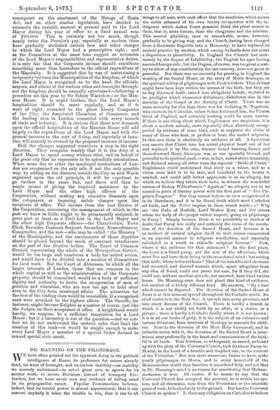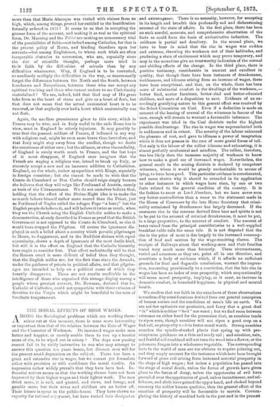DR. MANNING ON THE PILGRIMAGE.
WE have often pointed out the apparent decay in the political intelligence of Rome, its preference for causes already dead, its want of foresight, and its curious inability—an inability we scarcely understand—to select great men as agents for its secular work, to secure Dictators instead of trumpery Pre- tenders, but we have never seen any evidence of failing mind in its propagandist career. Popular Protestantism believes, indeed, that its mental power is almost supernatural, that it can convert anybody it takes the trouble to win, that it can be all things to all men, with such effect that the asceticism which moves the noble ashamed of his own luxury co-operates with the in- dulgence which makes Essex peasants think the priest nearer to them, that is, more human, than the clergyman and the minister. This mental pliability, once so remarkable, seems, however, gradually to be giving way, and the Church, having been changed from a theocratic Republic into a Monarchy, to have replaced its ancient practice by another, which among its faults does not count a disposition to plausibility. In England the Church lost enor- mously by the dogma of Infallibility, the English for ages having resented foreign rule; but the Dogma, of course, was too great a mat- ter to allow of any consideration for one country, however great or powerful. But there was no necessity for pressing in England the worship of the Sacred Heart, or the story of Marie Alacoque, or the spiritual utility of pilgrimages with Cook's tickets. They at least might have been kept within the arcana of the faith, but they are to-day blazoned forth, raised into obligatory beliefs, declared to be prodigies which whosoever disbelieves, disbelieves also in the miracles of the Gospel or the divinity of Christ. There was no more necessity for this than there was for declaring St. Napoleon, who exists in the Calendar, unless Sedan dethroned him, the Patron Saint of England, and certainly nothing could be more unwise. If there is one thing about which Englishmen are suspicious, it is about a modern miracle, more especially when absolutely unsup- ported by evidence of some kind, such as supports the claim of many of those who bear, or profess to bear, the sacred stigmata. In this case there is absolutely no evidenee at all. A hysterical nun asserts that Christ tore her actual physical heart out of her and replaced it by His own, whence issued burning flames, and thenceforward Marie Alacoque was as one specially blessed, and powerful to do spiritual good,—was, in fact, raised above humanity, and declared among all other nuns the especial "Bride of Christ." Englishmen could understand that story as a vision, and as a vision even hold it to be true, and beneficial to the hearts it reached, and could still better appreciate it as an allegory, for which we believe they retain their taste, as witness the wonderful success of Bishop Wilberforce's " Agathos," an allegory not to be named in point of literary power with the first part of " The Pil- grim's Progress." But they cannot believe or even comprehend it in its literalness, and it is its literal truth which most Catholics set forth, and the Tablet implies in these round words :—" Why are the Duke of Norfolk, Lord Walter Kerr, and 500 others whom the body of the people rather respect,' going on pilgrimage to Paray ? Simply because there is no possibility or shadow of doubt that Paray was really and certainly the scene of the revela- tion of the devotion of the Sacred Heart, and because it is an instinct of natural religion itself to visit scenes consecrated in an especial manner to religious recollection, and especially calculated as a result to enkindle religious fervour." Now, where is the evidence for that statement ? In the first place, the heart is a blood-pump, not the seat of the affections, which must live and have their being in the uninaterial mind ; but setting that aside, where is the evidence? That of the nun who said the scene had occurred, and showed wounds which, apart altogether from any idea of fraud, could not prove her case, for if they did, she could not, without another miracle, not asserted, have lived twelve hours. Dr. Manning even does not plead this kind of evidence, but another of a widely different kind. He answers, " By a fact which cannot be disputed. The devotion of the Sacred Heart of Jesus is at this moment spread throughout the Catholic world. Its chief centre is in the Holy See ; it spreads into every province, and into every diocese of the Church. There is hardly a church in which it is not visibly set forth by an altar, or a shrine, or a picture ; there is hardly a Catholic family where it is not known ; it is in all our books of piety, it is the subject of an extensive and various literature, from treatises of theology to manuals for child- ren. Next to the devotion of the Most Holy Sacrament, and in intimate union with it, the devotion of the Sacred Heart is inter- woven most profoundly in the heart and consciousness of the faith- ful in all lands. This devotion, so widespread, so sacred, so bound up with the piety of the Universal Church, took its rise at Paray-le- Monial, in the heart of a humble and despised nun, in the convent of the Visitation." But men more numerous, brains as keen, make yearly pilgrimages to Mecca, and in every household of the Mohammedan world that function is considered holy, and yet that in Dr. Manning's mind is no reason for considering that Moham- medanism is true. Of course, if he means to say that the Universal Church has accepted the account, he is within his sys- tem, and all discussion, save from the Protestant or the scientific point of view, falls absolutely to the ground. But has the Universal Church so spoken ? Is there any obligation on Catholics to believe more than that Marie Alacoque was visited with visions from on high, which, among things, proved her entitled to the beatification formally ordered in 1864? It seems to us that in accepting the grosser form of the account, and making it as real as the spiritual form, Dr. Manning and the Tablet are making an unnecessary trial of the possibilities of faith—not indeed among Catholics, for that is the present policy of Rome, and binding therefore upon her servants—but among Englishmen, to Whom such trials are often insuperable obstacles to conversion, who are, especially since the rise of scientific thought, perhaps more tried in their faith by the difficulties of miracle than by any difficulties whatsoever. Why, if England is to be converted, so needlessly multiply the difficulties in the way, so unnecessarily forget the differences between the North and the South, between Londoners and Neapolitans, between those who can accept any spiritual teaching and those who cannot endure to see Christianity materialised ? We are, indeed, told that God may of His grace take from us the heart of stone and give us a heart of flesh, but that does not mean that the actual anatomical heart is to be removed, or that anybody ever had a heart which anatomically was not flesh.
Again, the needless prominence given to this story, which in France may be wise, and in Italy useful to the ends Rome has in view, must in England be utterly injurious. It may possibly be
• true that the peasant soldiers of France, if inflamed in any way with religious zeal, might be even more brave than heretofore, and that Italy might stay away from the conflict, though we doubt 'the occurrence of either case ; but the alliance, or even the cordiality, of England is surely worth much to France, and the last hope of it must disappear, if England once imagines that the French are waging a religious war, intend to break up Italy, or sincerely accept a new and an immense addition to Catholicism. England, on the whole, rather sympathises with Kings, especially in foreign countries ; but she cannot be made to wish that the Comte de Chambord or Don Carlos should reign simply because she believes that they will reign like Ferdinand of Austria, merely as tools of the Ultramontanes. We do not ourselves believe that, holding that the effect of the Divine-Right idea is to make the monarch believe himself rather more sacred than the Priest, just as Ferdinand of Naples called the refugee Pope "a bore;" but the English people do believe it, and will believe it twice as much, when they see the Church using the English Catholic nobles to make a demonstration, already described in France as proof that the British Government is not opposed to the Comte de Chambord, as else it would have stopped the Pilgrims. Of course the ignorance dis- played in such a belief about a country which permits pilgrimages to Mecca, to Juggernaut, and to the Buddhist shrines with equal equanimity, shows a depth of ignorance of the most docile kind, but still it is the effect on England that the Catholic hierarchy here ought to consider first. That effect undoubtedly will be that the Roman creed is more difficult of belief than they thought, that the English nobles are, for the first time since the Armada, under the guidance of priests in political affairs, and that pilgrim- ages are intended to help on a political cause of which they heartily disapprove. Those are not results creditable to the intelligence of those who organised this strange display among a people whose greatest convert, Dr. Newman, declared that he, Catholic of Catholics, could not sympathise with those extasies of devotion to the Virgin which might be beneficial to the men of Southern temperament.































 Previous page
Previous page